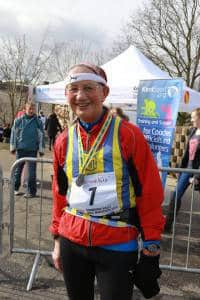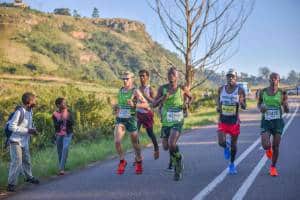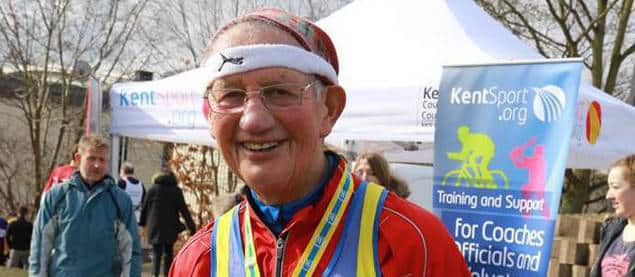
ONEÂ man for whom life is a marathon, not a sprint, is Graham Brooks.
He has been running in the Tunbridge Wells Half Marathon since it began in 1983 and now, aged 84, he’s warming up for the next one on February 19.
One thing’s for sure, he’s guaranteed to win the Over-80s category.
“I’m lucky in lots of ways,” Graham admits. “I’m the only one above 80 so I don’t have much competition.
“It’s not because I’m good, it’s because I’m the only one. And whenever I see that someone else is approaching 80, I start worrying about what happens next. How good are they going to be?”
Graham was born in Umtata in South Africa’s Transkei, where Nelson Mandela came from, but has lived in Tunbridge Wells since 1969. A chemical engineer by trade, he was a founder member of the Tunbridge Wells Harriers Running Club.
He is being rather modest about his athletic abilities. The long run began back in his native South Africa, when he took part in the Comrades Marathon, a 90km race between Durban and Pietermaritzburg.
“Back in South Africa most people played sport at school, so I played cricket and rugby, tennis and squash. I started running to keep fit for squash, because you need to train hard in case you have to play a five-setter.
“Comrades is a very special race to me. I did it twice, I remember that one of my times was ten hours 35 minutes. You do five months of training from the start of the year. Every weekend you do a marathon, then you do three 54km races.
“It’s very important that you put a lot of energy drinks into yourself. But provided you do that, it’s not a problem, you just keep going.”
As if 90km was not far enough, when Graham came to the UK he took a step further – and then some more. “I’ve run 100 miles twice, with the London Distance Walkers Association up in the mountains of north Wales.
“The first time it took about 30 hours, the second time was 42 hours. But that was ten years ago.” Let’s just pause for breath there: 42 hours – at the age of 74.
How do you actually do that? “You keep running or walking throughout this period, but you have stops for food and rest, and perhaps even a sleep. Say two hours, if you feel the need.”
It makes your body strong. When winter comes, my friends tend to get ill but I don’t
Graham is still running marathons, though he admits that he prefers to avoid the hilly courses because otherwise he struggles to make the six-and-a-half-hour cut-off time.
“It’s a bit of a challenge,” he admits. “I still try to run two marathons a year, although I tend to only do the flat ones – like Hamburg and Edinburgh.”
The Tunbridge Wells Half Marathon has one fairly brutal climb, 300ft up Spring Hill into Fordcombe.
“In the Half you’ve got a really big hill in the last few miles, but you’ve just got to keep plodding along and you will get to the top. It’s not a problem for me.
“
The only problem is that every year you get slower. I’m pretty slow at the moment. The Half takes me about three hours now.
“I get a special concession from the race organiser, Mark Taylor. He lets me start the race half an hour early. I get passed after about six miles and then you’ve got someone to chase. You’ve got to have that or you get lazy, it makes a real difference.”

So what motivates the octogenarian to keep going? “I like running because it keeps me fit for life. It makes you healthy, you don’t catch colds and it makes your body strong. When winter comes, friends of mine tend to get ill, but I don’t.
“I don’t get aches and pains either,” Graham adds. “I do short runs, duration one hour, five times a week around the streets of Tunbridge Wells, and then I go running once a week with the club.”
Graham has four children and seven grandchildren. Does his family think he’s crazy? They wouldn’t dare. In fact there will be three generations of the Brooks family running in the Tunbridge Wells Half Marathon this year.
“My daughter Jackie, who also lives in the town, has taken up running at the age of 50. She began with Sarah’s Runners, it’s a club that starts the ladies off and then they become -Harriers. She’s coming along nicely. She will be taking part in the Half with her daughter Amy, who’s 18.”
So what’s next for the man who can’t stop running? As ever, there’s another challenge ahead.
“I’m looking forward to getting into the next category, for 85 to 89 year olds.”
If you would like to enter the Tunbridge Wells Half-Marathon visit www.twharriers.org.uk or www.race-nation.com
Four weeks to go:
Why flexibility and strength are crucial
If you’ve signed up for the Tunbridge Wells Half Marathon on February 19, you’ve probably been out braving the elements to get the miles in. But working on your strength and flexibility are also important for a great race.
There’s no getting away from it, running is very high impact and puts a lot of pressure on your joints; over long distances, that pressure is compounded.
But working on your strength and flexibility will enable your body to cope with those pressures better and help you avoid injury.
Jane Dew, a fitness instructor at Nuffield Health Fitness and Wellbeing Gym at Knights Park and a run leader for RunTogether, is here to guide you through your build-up to the big race.
She says: “Logically, you think you need to work on leg strength to protect knees, ankles and hips, but you should also work on your core to assist pelvic stability and upper body to help you maintain good posture over distance.”
“You may not realise it, but you use them all when you’re running. For example, if you have a shoulder weakness it may put your spine out of alignment, which can then lead to injury if you are running high mileage.
“The stronger the muscles, the less likely you are to suffer fallout from the impact of running.”
All exercise shortens your muscles, leading to tightness, so it is also important to work on your flexibility.
“This isn’t helped by our modern lifestyles,” says Jane. “We tend to sit down a lot, leading to tight hip flexors and weak glutes.
“If you get a tight muscle somewhere it will cause your body to be uneven, which you wouldn’t necessarily notice in everyday life. But once you start putting in longer distances you are likely to feel it, and it could result in an injury.”
You can overcome some of this tightness by stretching properly after each run, but Jane advises that most runners can benefit from additional flexibility training.
Jane recommends yoga and Pilates as appropriate exercises.
“Not all runners are good at stretching after each run, and those who do often concentrate on their legs,” she says.
She also suggests gym courses such as grit strength, bodypump and kettlercise for weighted strength training.
But she adds: “You don’t have to use weights for strength. Body-weight workouts, incorporating squats, lunges, press-ups and sit-ups also work well.”








